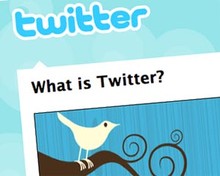
UK users will still be able to update Twitter accounts from mobiles, co-founder Biz Stone said in an email announcement, but charges from mobile operators had made free outbound alerts unsustainable.
The service has become increasingly popular with newspapers in the UK, who have adopted the tool for covering live events, sending breaking news alerts and for crowdsourcing initiatives.
Plans to advertise more than 20 feeds from the Croydon Advertiser are now 'dead in the water', because of the changes to the service, Jo Wadsworth, news editor of the paper, told Journalism.co.uk.
"Twittering via SMS has really come into its own for me on those occasions when I’ve been out of the office, and followers who know I’m hungry for news have direct messaged me to tell me stuff which is going on. A couple of times this has been when I’ve been at festivals, surrounded by mud and armed only with my crusty old phone – and it’s meant I’ve been able to call reporters to make sure our coverage of breaking news is on track," said Wadsworth.
But the most important aspect of Twitter is still intact: the ability for journalists to 'quickly, easily and efficiently' cover live events, said Christian Dunn, digital editor for the Evening Leader.
The paper, which has used the tool to report from football matches and local elections, hopes subscribers to its Twitter feeds will find alternative methods to following them.
Figures for the Advertiser's feeds show that most readers access the service online, added Wadsworth, where applications such as Twhirl and Twitterific can be used to display alerts.
Shifting focus onto online access of Twitter will be crucial in maintaining the value of the service to readers, agreed Alison Gow, deputy editor of the Liverpool Daily Post, in an email to Journalism.co.uk.
As a result of the changes the Post is planning to increase the promotion of its Twitter feeds.
"Our audience profile means most users are actively online during their working week so have access to their Twitter stream, but it would have been nice to have a bit more notice from Twitter that the SMS service was being dropped," she said.
The paper had planned to promote its Liverpool and Everton football Twitter feeds as 'free news text alerts straight to your mobile', but will now rethink this move.
"I think the reaction would have been extremely positive as it's such a simple concept - you sign up and get tweets with a news snap and link. Losing the ability to have alerts direct to your mobile is bound to influence some readers as to whether they sign up - after all, the beauty of Twitter is that it's so simple: you receive an SMS, read, and respond if you wish."
Gow said the paper would be careful to explain to readers the changes to the service and how the feeds can be accessed online.
"Twitter is an extremely complicated concept to explain simply to readers who are not immersed in the tech world. Taking the 'free text messages on you phone' aspect out of Twitter makes it even harder," explained Joanna Geary, development manager at the Birmingham Post, which has set up Twitter feeds for its news, business, sport and lifestyle content.
A lack of free outbound messages to mobiles will also change what events the Post will use Twitter for, said Geary, with plans to create an event alert facility for conferences in the city no longer viable.
Editors from the regional titles said the changes to the service showed the difficulties of using third-party websites.
"I don't think newspapers should necessary stop using the service, they just have to bear in mind that like any free third-party website it has its limitations," said Dunn, who added that he would happily look for and use alternatives to Twitter if they became available.
Changes for UK users could see a move away from the service by newspapers, if a suitable replacement is developed.
Alternatively UK newspapers could see this as an opportunity to set up their own mobile alert systems, suggested Wadsworth, making them available through services like Twitter, 'but not dependent on them.'
"We'll keep using Twitter - not just for alerts but also for our liveblogging - but maybe we can look at other alternatives too," said Gow.
"We're always looking for new ways of building our network - Twitter is still valid but it's not the only show in town."
Free daily newsletter
If you like our news and feature articles, you can sign up to receive our free daily (Mon-Fri) email newsletter (mobile friendly).









